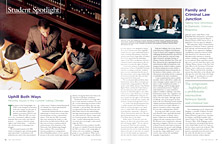The Real World
Students Tackle Supreme Court Immigrants’ Rights Case
Printer Friendly Version The U.S. Supreme Court considered an immigrants’ rights case this year in which several NYU School of Law students participated, writing amicus briefs and assisting the lawyer who argued the case. While the Court ultimately decided in favor of the Immigration and Naturalization Service (INS) in the case, Law School students contributed to the case’s success at the appellate level, and the Supreme Court extensively relied on a student-written brief in a dissenting opinion.
The U.S. Supreme Court considered an immigrants’ rights case this year in which several NYU School of Law students participated, writing amicus briefs and assisting the lawyer who argued the case. While the Court ultimately decided in favor of the Immigration and Naturalization Service (INS) in the case, Law School students contributed to the case’s success at the appellate level, and the Supreme Court extensively relied on a student-written brief in a dissenting opinion.
In 1996, Congress, in order to address perceived failings by the INS, enacted several laws to reform the immigration system. Some provisions of these laws have been criticized as harsh anti-immigrant measures and certain parts have been held unconstitutional. The specific statute at issue in Demore v. Kim, 8 U.S.C. §1226(c), compels the INS to detain immigrants who have been convicted of crimes that may prompt their ultimate removal from the United States.
Congress made a categorical determination that immigrants charged by the INS with being deportable should be subject to mandatory detention during the pendency of their removal proceedings. The U.S. Court of Appeals for the Ninth Circuit held this statute unconstitutional as applied to Hyung Joon Kim, a lawful permanent resident who has been living in the United States since he was six years old. At heart, this case pitted the fundamental liberty interests of an individual against the state’s ability to make categorical determinations based on immigration policy.
Judy Rabinovitz (’85), senior staff attorney at the American Civil Liberties Union’s Immigrants’ Rights Project and NYU School of Law adjunct professor, argued the case on behalf of Kim. Rabinovitz has been involved with challenges to §1226(c) since it took effect in 1998, and has successfully argued the issue in Kim in three circuits. Each of the circuit courts held that due process requires an individualized bond determination assessing danger to the community and flight risk, and rejected the government’s argument that its plenary power in immigration cases deserves latitude wide enough to enact such a categorical rule.
During oral argument Justices Sandra Day O’Connor and Anthony Kennedy had difficult questions for both sides, but seemed uncomfortable with the idea that due process requires more than is provided under §1226(c). To address these concerns, Rabinovitz directed the Court’s attention to an amicus brief filed by a group of immigrants’ rights associations.
This brief, prepared by NYU School of Law students Alexsa Alonso (’03), Kevin Lapp (’04), Christopher Le Mon (’03), and Isaac Wheeler (’03), under the direction of Law School Professor Nancy Morawetz, presented the harsh reality of §1226(c). The experiences of numerous immigrants with this statute demonstrate that immigrants held without possibility of bail for up to 17 months are later released when it turns out that the INS accusation that they are deportable was incorrect.
Ultimately, the Court ruled in April that mandatory detention of lawful permanent residents during their immigration proceedings is constitutional.
The Immigrant Rights Clinic at NYU School of Law started working on this issue in the clinic’s first year of existence. Clinic students addressed the issue on behalf of Citizens and Immigrants for Equal Justice, a national coalition of family members of persons who face deportation and detention.
The circuit-level briefs, written by clinic students Tony Lu (’02), Rachel Rosenbloom (’02), Mike Shumway (’00), and Rhodri Williams (’00), were referenced at oral arguments by some circuit courts. The brief was subsequently updated and submitted to several courts by pro bono counsel at Kramer Levin, helping to lead to the string of favorable circuit court opinions.
When the Supreme Court took the case, Alonso and Wheeler, assisted by Lapp and Le Mon, reworked the amicus brief to fit the specific issues anticipated to be important to the Supreme Court.
Justice David Souter’s dissent (which was joined by Justices John Paul Stevens and Ruth Bader Ginsburg) refers to the brief by name four times to support four different points:
• Many immigrants facing mandatory detention have legal issues in their cases that will not be resolved until the conclusion of their proceedings.
• Many of these issues require research and evidence, so that immigrants are greatly disadvantaged by being forced to litigate their cases in remote detention centers far from witnesses and counsel.
• Many immigrants with these merits issues win their cases.
• Many immigrants suffer months or years of detention while they fight against their deportation.
Two other Law School alumni, Wanyong Austin (’83) and Christopher Meade (’96), were also actively involved in the case. As an ACLU contract attorney during 1999 and 2000, Austin worked closely with Rabinovitz on all aspects of the litigation strategy, and later helped to coordinate amicus briefs to the Supreme Court. Meade, a Root-Tilden-Kern Scholar and an associate at Wilmer, Cutler & Pickering, devoted countless pro bono hours as co-counsel on the brief.
In addition, students Benita Jain (’03) and John Radice (’03) assisted Rabinovitz through the Law School’s Hays Fellowship Program, which provides students with opportunities to work with top-notch practitioners in civil rights and civil liberties. Jain and Radice researched legislative history and immigration cases and edited the final brief. An earlier Hays fellow, Iris Bennett (’99), also developed legal arguments for the first challenge to the statute in November 1998, and subsequently assisted with the Ninth Circuit litigation.

 Multimedia
Multimedia